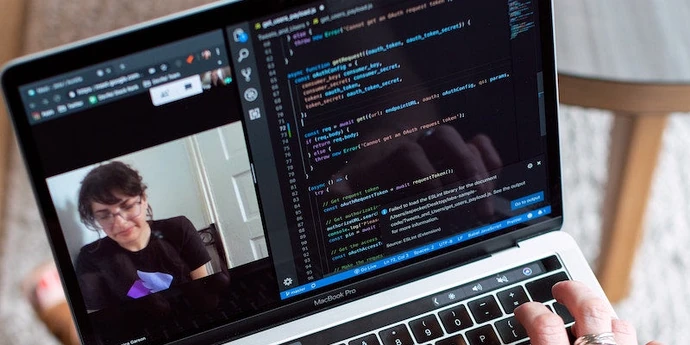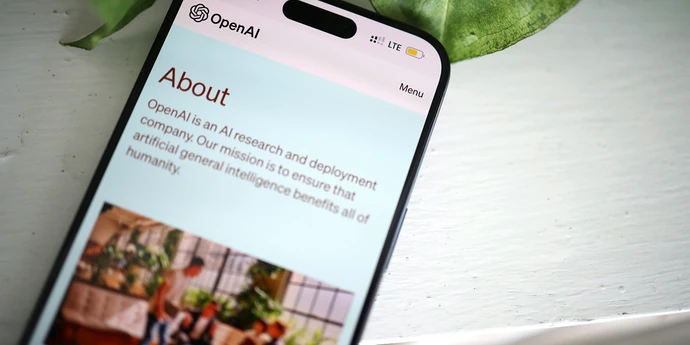The interview process at Meta is challenging, especially for the engineering manager role where the bar is set high.
The good news is that the right preparation can make a big difference and can help you land a job as an engineering manager at Meta. To help you get there, we’ve put together the ultimate guide below, with help from our expert coaches, Sidhanshu, Engin, Pranav and Tom, ex-engineering managers and interviewers at Meta.
Here's an overview of what we'll cover:
- Role and salary
- Interview process and timeline
- Example questions (Initial interview)
- Example questions (Onsite)
- Interviewing tips
- Preparation plan
If you're applying at Meta for a non-management engineering role, we have interview guides for production engineer, data engineer, front-end engineer, and software engineer roles.
Let's go!
Click here to practice mock interviews with Meta engineering manager interview coaches
1. Meta Engineering Manager Role and Salary↑
Before we cover your Meta engineering manager interviews, let’s take a look at the role itself.
1.1 What does a Meta Engineering Manager do?
An engineering manager or EM at Meta is responsible for building, managing, and supporting a team of engineers across Meta’s domains, such as data infrastructure, product infrastructure, AR/VR, machine learning, etc.
As a Meta EM, you lead the goal-setting for your team, regularly checking in with your engineers to ensure you’re working towards the same goal.
As Pranav, ex-engineering manager at Meta explained to us, "Meta is an engineering-driven company and engineers make most of the technical decisions." As the EM, it is your task to provide them with the support they need as they tackle these projects, whether it’s in the form of administering budgets, coordinating cross-functional collaboration, and helping solve complex tech challenges.
Another thing that makes Meta unique is its bottom-up culture, says Tom, ex-data engineering manager at Meta. For every Meta candidate, especially those in the engineering and engineering leadership roles, "There is an expectation that you will have a strong level of autonomy, ownership and dealing with ambiguity."
A Meta EM is also responsible for helping shape the career growth of the engineering team. Engin, ex-engineering manager at Meta, says that the company places a strong emphasis on technical craft and individual growth. He says: “One aspect of the Meta engineering culture is that engineers are expected to influence a great deal what they want to work on and how they want to hold themselves accountable.” As EM, you need to support your engineers by helping them discern their specific strengths and find opportunities to build solutions that play to their strengths and excite them.
Lastly, the EM is the bridge between technical and non-technical teams and collaborators, including stakeholders. You need to have deep technical expertise and interpersonal skills to facilitate communication between the two.
What skills are required to be a Meta Engineering Manager?
An analysis of engineering manager job posts at Meta shows that it requires its EM candidates to have a Master's degree in Computer Science, Computer Software, Engineering, Applied Sciences, Mathematics, Physics, or a related field plus at least 3 years’ worth of experience in a computer-related field, including hands-on software engineering work.
You’ll also need to have experience coding in one of the following languages: C++, Java, Javascript, Python, or PHP.
Finally, you'll need to have significant engineering management experience in order to be a strong candidate. You'll need to have managed a team of engineers, hired people, and helped them perform. Experience with implementing strategies and planning for risk and growth is also listed as a minimum requirement, among other things.
1.2 How much does a Meta Engineering Manager make?
Meta's competitive salary is among the numerous factors that draw engineering managers to the company. Below are the average salaries and compensations for the different engineering manager levels at Meta. This is based on the reported data from Levels.fyi.
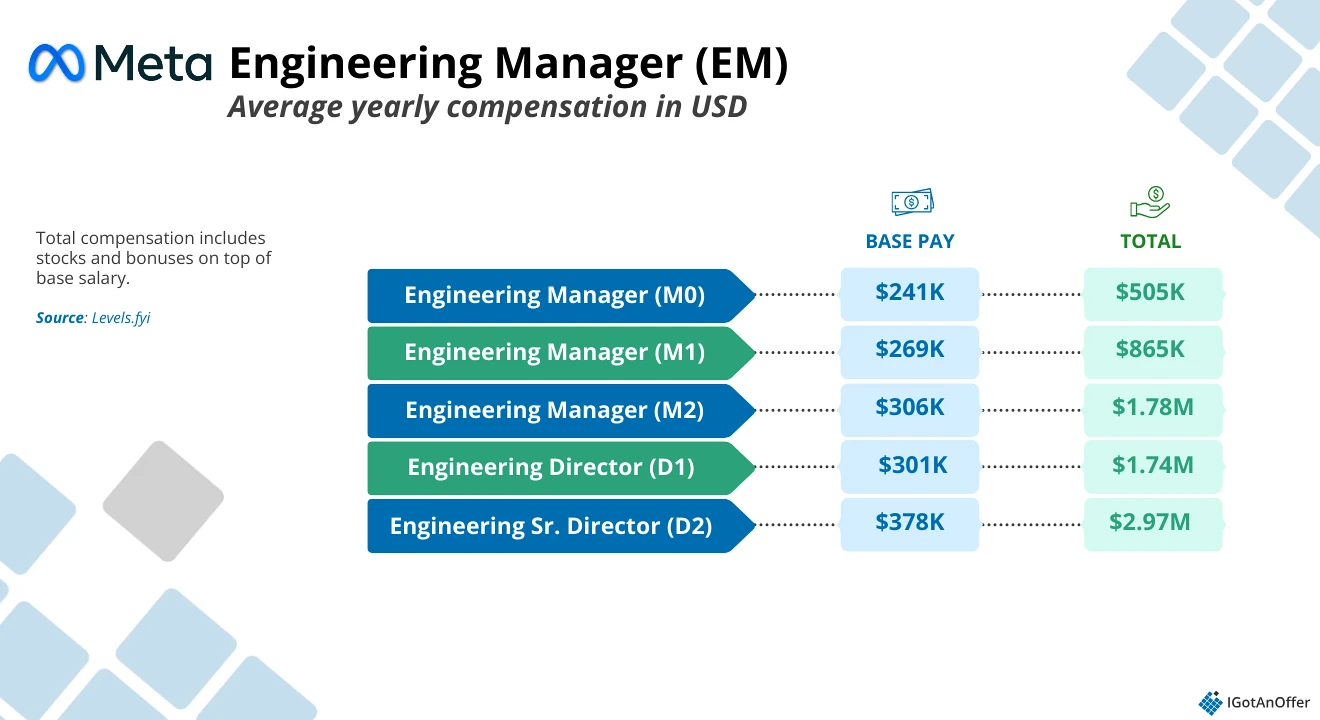
Meta engineering managers generally have a higher base salary and compensation than the engineering managers of other big tech companies. According to Glassdoor, the average salary of Meta EMs is 63% higher than the average salary of other engineer managers in the US.
The average salary of Meta Engineer Managers also varies depending on location or region. For example, an M2 Meta EM in the US has a much higher annual salary than an M2 Meta EM in India.
While we presume that you already know which specific EM level you are applying for, it’s still good to double-check this with your recruiter. Your recruiter should be able to advise you on which level you’re being evaluated.
Ultimately, how you do in your interviews will help determine what you’ll be offered. That’s why hiring one of our ex-Meta interview coaches can provide such a significant return on investment.
And remember, compensation packages are always negotiable, even at Meta. So, if you do get an offer, don’t be afraid to ask for more. If you need help negotiating, consider booking one of our salary negotiation coaches to get expert advice.
2. Interview Process and Timeline↑
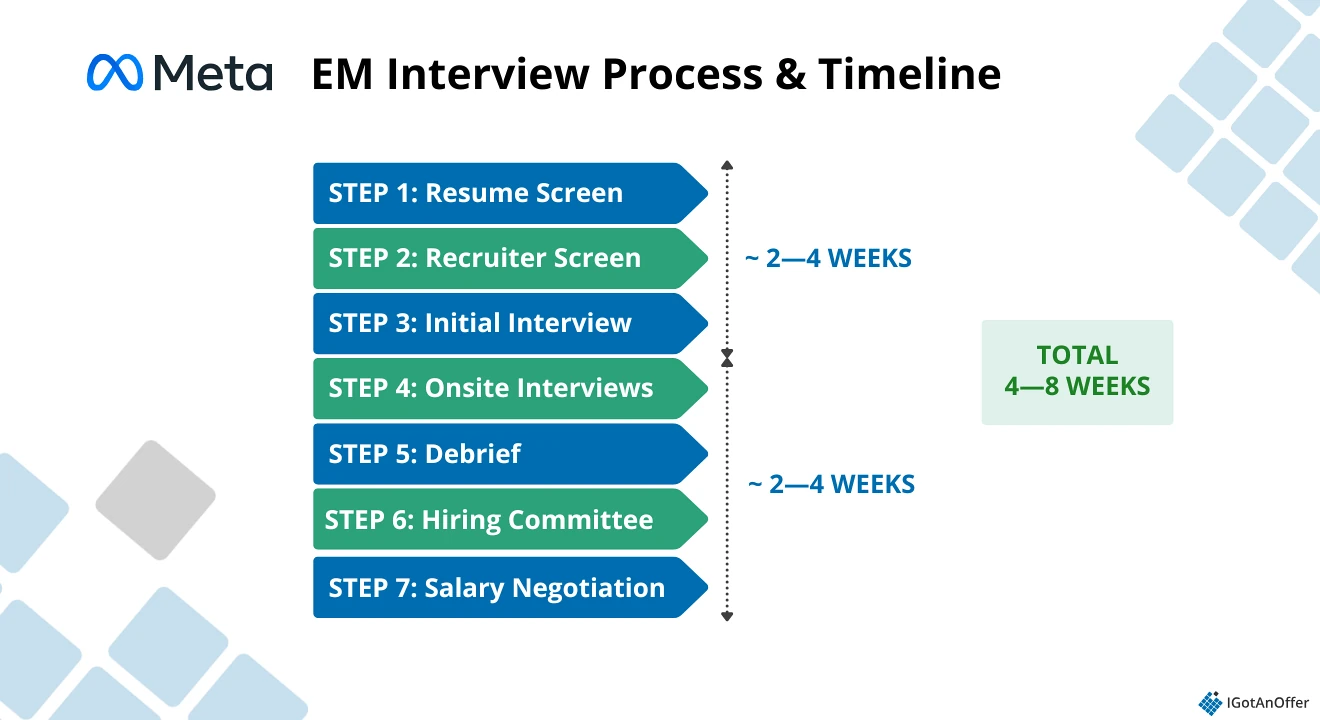
2.1 What interviews to expect
What's the Meta engineering manager interview process and timeline? It takes four to eight weeks on average and follows these steps:
- Resume screen
- Recruiter phone screen
- Initial interview: 1 x 45-minute interview
- Onsite: 5 or 6 x 45 minute interviews
Let's look at each of these steps in more detail below:
2.1.1 Resume screen
First, recruiters will look at your resume and assess if your experience matches the open position. This is the most competitive step in the process, as millions of candidates do not make it past this stage.
You can use this engineering manager resume guide to help tailor your resume to the position you’re targeting. You can also take a look at real Meta resume examples.
And if you’re looking for expert feedback, you can also get input from our team of ex-Meta/Facebook recruiters, who will cover what achievements to focus on (or ignore), how to fine-tune your bullet points, and more.
2.1.2 Recruiter phone screen
In most cases, you'll start your interview process with Meta by talking to an HR recruiter on the phone. They are looking to confirm that you've got a chance of getting the job at all, so be prepared to explain your background and why you’re a good fit at Meta. You should expect typical behavioral and resume questions like, "Tell me about yourself","Why do you want to work at Meta?", or "Tell me about your current day-to-day."
If you get past this first HR screen, the recruiter will then help schedule an initial interview with a Meta engineering manager. One great thing about Meta is that they are very transparent about their recruiting process. Your HR contact will therefore walk you through the remaining steps in the hiring process, and will also share with you a helpful email listing resources you can use to prepare.
2.1.3 First-round: 1 x 45-minute interview
The next step after your recruiter call is the initial interview. This will usually be one 45-minute call with an engineering manager at Meta. Some candidates also have a second call that’s more technical.
You can expect the interview to include three parts:
- People management and cross-functional collaboration
- Technical design and architecture
- Career conversation and motivation
We'll get into these in more detail below. You'll also get a chance to ask some questions at the end of the interview.
2.1.4 Onsite: 5 or 6 interviews
If you pass the initial interview, you’ll be invited to do the "onsite". The onsite interviews are the biggest test for Meta EM candidates. During this interview loop, you'll have five or six separate 45-minute interviews with several different engineering managers and leaders from Meta, consisting of:
- Leadership interviews (people management, cross-functional collaboration, cross-functional partnerships, building culture)
- Retrospectives (technical and/or non-technical)
- System design and architecture interview
- Coding
- Product design
- Machine learning
We'll dive into each of these interviews in section 4.
2.2 What happens behind the scenes
Your recruiter is leading the process and taking you from one stage to the next. Here's what happens behind the scenes at each of the stages described above:
- After the initial interview, the interviewer you talked to has 24h to submit their ratings and notes on the internal system. Your recruiter then reviews the feedback, and decides to move you to the onsite/full loop interview or not, depending on how well you've done.
- After the onsite, your various interviewers will make a recommendation on hiring you or not and the recruiter compiles your "packet" (interview feedback, resume, referrals, etc.) If they think you can get the job, they will present your case at the next candidate review meeting.
- Candidate review meetings are used to assess all candidates who have recently finished their interview loops and are close to getting an offer. Your packet will be analyzed and possible concerns will be discussed. Your interviewers are invited to join your candidate review meeting, but will usually only attend if there's a strong disagreement in the grades you received (e.g. 2 no hires, 2 hires). If after discussions the team still can't agree whether you should get an offer or not, you might be asked to do a follow-up interview to settle the debate. At the end of the candidate review meeting, a hire / no-hire recommendation is made for consideration by the hiring committee.
- The hiring committee includes senior leaders from across Meta. This step is usually a formality and the committee follows the recommendation of the candidate review meeting. The main focus is on fine-tuning the exact level (and therefore the compensation ) you will be offered.
It's also important to note that hiring managers and people who refer you have little influence on the overall process. They can help you get an interview at the beginning, but that's about it
3. Meta Engineering Manager Example Questions (Initial)↑
As we mentioned above, for the position of Meta Engineering Manager you'll face three types of questions in your initial interview:
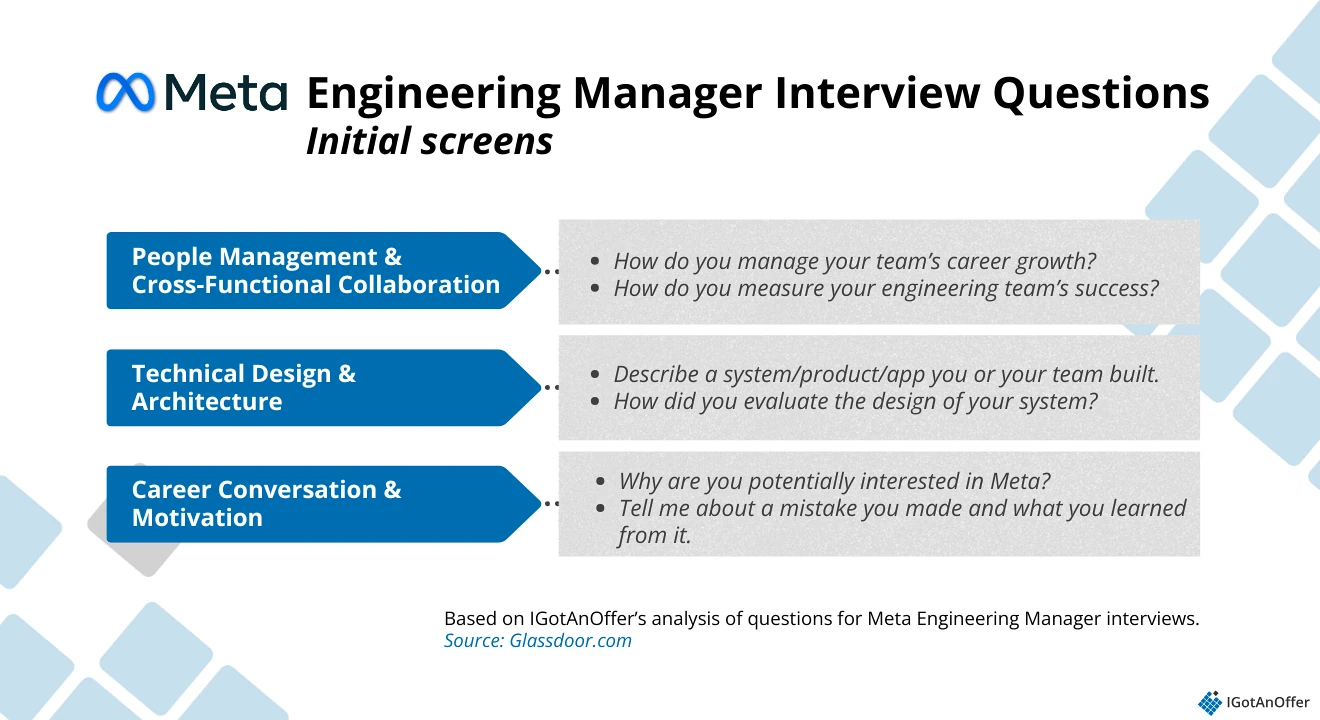
Now let’s take a closer look at the three different types of question you'll face in the initial interview.
We’ve provided example questions that we’ve found from our research on Glassdoor and the official Meta engineering leadership initial interview guide. We've categorized the questions and we've changed the grammar and phrasing in some places to make the questions easier to understand.
3.1 People management & cross-functional collaboration questions
Meta engineering managers need to have superb soft skills in order to lead teams and projects and facilitate seamless collaboration between engineers and cross-functional teams. The people management and cross-functional collaboration interview is to test these soft skills and see if you’ve got what it takes to be a leader at Meta.
You’ll need to show that you can build a team and keep it motivated, solve conflicts, and communicate complex concepts. While the focus is mainly on how you manage people, you should also expect the odd project management question and general behavioral/situational questions.
Pranav, ex-Meta engineering manager, told us that Meta looks for the following key traits in engineers. As you will be leading a team of engineers yourself as an EM, you’ll want to demonstrate these traits as well:
- How good are they at resolving conflict with their peers, managers, or external teams?
- Do they have a growth mindset? Do they accept feedback openly and work on them to resolve it?
- How well do they deal with ambiguity? How do they bring structure in place when there is none?
- How do they sustain progress despite multiple hurdles?
- How well do they communicate with peers, cross-functional partners, and teams?
Let’s look at some of the most frequent examples that we found in the Glassdoor data and the official Meta EM guide.
Example people management questions for the engineering manager interview at Meta
- How do you manage your team’s career growth?
- How do you manage difficult conversations?
- How do you manage underperforming employees?
- Tell me about a difficult employee situation that you handled well/not so well.
- What would you do with someone who had stayed at the same level for too long?
- How do you recruit good engineers?
- How do you manage projects?
- Describe a tough situation where you demonstrated leadership.
- A tech lead on your team tells you, “I want to be a manager.” How do you respond?
- Have you ever had to dismiss someone from your team?
- What’s the value of one-on-ones with your team members?
- How do you measure the success of an engineering team you are managing?
Find more questions to practice with by reviewing our guides to people management interviews and Meta behavioral interviews.
3.2 Technical design and architecture questions
In this technical interview, expect your interviewers to focus on your past system and product design and building experiences. The interviewer will be trying to get a sense of whether your understanding of design and architecture is strong enough to merit testing you further on it at the onsite stage.
Example technical design questions for the engineering manager interview at Meta
- Describe a system/product/app you or your team built.
- How did you evaluate the design of your system?
- How did you test performance and scalability?
- Describe the bottleneck of the system you designed.
- Tell me about the most technically complex project you've managed. How did you resource your team?
You'll need to spend time looking back over a recent project and practicing explaining how you did it and the trade-offs you made. To refresh yourself on system design, you might want to read our series on system design fundamentals.
3.3 Career conversation & motivation questions
In this section of the initial interview, the interviewer will focus on your background and career goals to assess whether you’re a good fit for Meta and vice versa.
Example career conversation questions for the engineering manager interview at Meta
- Why do you want to work at Meta?
- What gets you excited?
- How do you plan on choosing your next role?
- What’s the biggest thing you want to learn?
- Why are you leaving your current job?
- Tell me about a mistake you made and the lesson you learned from it.
- Tell me about what you've been working on over the last year.
- Tell me about yourself.
- Describe something you have achieved and how you did it.
To practice with more general behavioral questions, check out our Meta behavioral interview guide and our guide on how to answer the ‘Why Meta’ question.
3.4 Your questions
At the end of the initial interview, it's your chance to ask questions about working as an engineer at Meta, as well as the various engineering leadership opportunities. Prepare a couple of thoughtful, intelligent, and relevant questions to show enthusiasm for the role and building a career at Meta.
4. Meta Engineering Manager Example Questions (Onsite)
The longest and most daunting step of the Meta engineering manager interview process is the onsite or "full loop". This may take place in person at Meta's physical offices, or via video call.
As explained in Section 2, you'll face 5 or 6 interviews at onsite stage, lasting 45 minutes each.
The first 3 question types apply to all Meta EM candidates. We've also included the latter 3 types, based on candidate reports on Glassdoor.
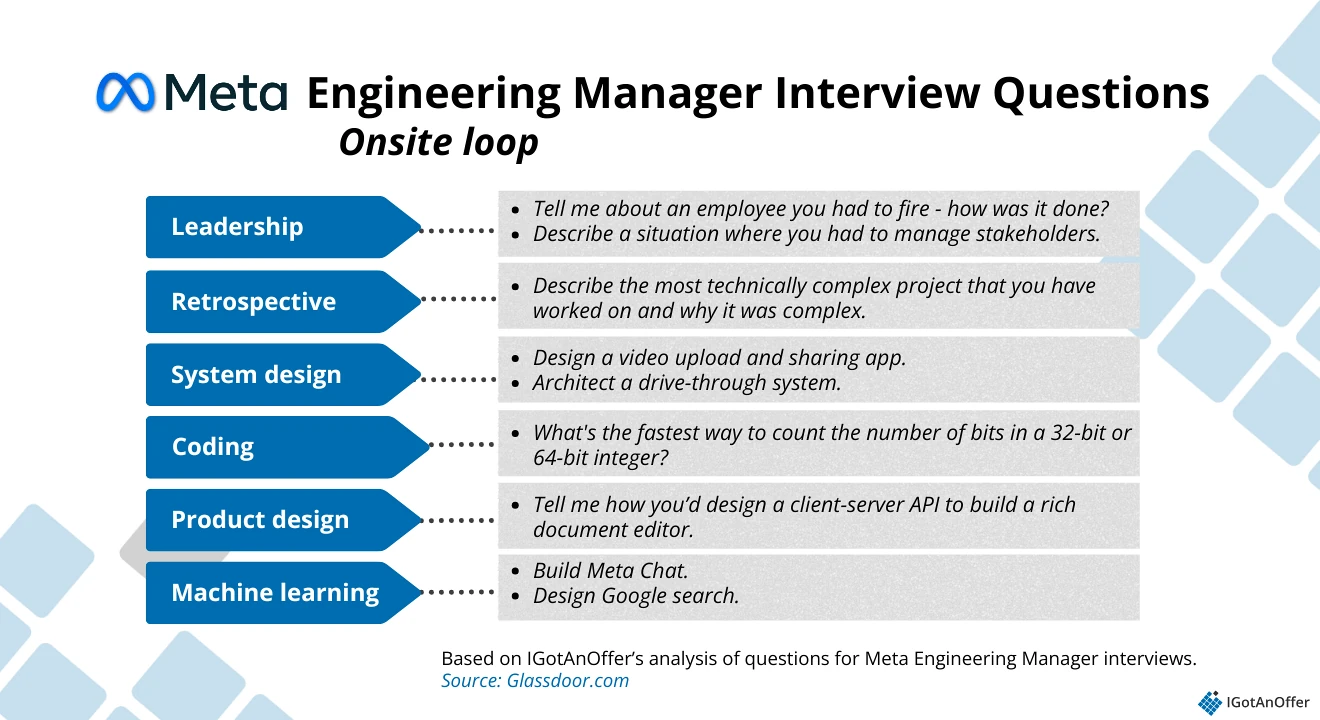
Let's go through each interview in detail, looking at some example questions and how to prepare.
4.1 Leadership interview questions
Every type of interview is a chance to show leadership skills, but Meta will give you at least two interviews dedicated to behavioral and hypothetical questions that test your leadership soft skills around managing and collaborating.
Example leadership questions for engineering manager interview at Meta
People management & cross-functional collaboration
- Tell me about an employee you had to fire - how was it done?
- Tell me about a time you had to deliver unpleasant news to someone reporting to you.
- What attributes do you look for in senior engineer candidates?
- What's your approach to 1-1s? How does your discussion change between ICs and managers?
- What do you think are the components of maintaining a healthy cross-functional dependency?
- How do you help people manage their careers?
- How do you create alignment between talented individuals that also happen to be strongly opinionated?
- How do you handle situations where an employee has underperformed?
Cross-functional partnerships
- Describe a situation where you had to manage stakeholders.
- Describe a challenging moment you had with another individual at your company.
- A senior leader from a different org has challenged your approach to a specific problem your team is working on, in a weekly standup. What would you do next?
- Describe a situation in which you and a colleague disagreed and how you managed it.
Building management and engineering culture
- What's your vision and strategy for your team for the next 12 - 16 months? What's your approach to defining that?
- How do you measure the success of an engineering team you are managing?
- How do you balance autonomy and direction? Tell us about a time you had to move the team in a different direction to what they wanted.
To prepare for these questions, we recommend you read our primer on leadership questions in tech interviews as well as this article by an ex-Google engineering manager on how to grok engineering manager leadership interviews.
4.2 Retrospective interview(s)
You'll face at least one project retrospective at Meta onsite stage - technical, and/or non-technical.
4.2.1 Project retrospective (non-technical)
The project retrospective is a deep-dive discussion of a project that you've worked on recently. Be ready to talk clearly and specifically about the project requirements, planning, general business understanding, negotiation with stakeholders and peers, setting metrics, considering trade-offs, and scaling systems and business processes.
Remember that the 'Project retrospective' is non-technical - Meta doesn't want you to get stuck into technical details here as it's more interested in soft skills like project management and business sense.
4.2.2 Technical project deep-dive
The technical retrospective will be conducted by a senior engineer. Again, it's a discussion, not a presentation, so don't come with a slide show. However, you might want to jump up and sketch out some designs or code on a whiteboard or a piece of paper.
Start off by explaining the project at a high level, and then jump into the details.
Example project retrospective questions in engineering manager interviews at Meta
- Describe a software development project you led and your approach
- Describe the most technically complex project that you have worked on and why it was complex.
- Talk through a project, product, or system you worked on: the design, technical problems you faced, how you solved them, trade-offs, etc.
For more guidance, check out our guide to Meta project retrospectives for EM and other roles.
4.3 System design and architecture
Facebook, Instagram, and WhatsApp all have 1bn+ monthly active users. Meta engineering managers therefore need to be able to design highly scalable systems, and the system design interviews are your chance to demonstrate your familiarity with such complex systems.
In this technical interview, you'll be asked to design a "Meta-scale system". It could be a Meta product, or something completely made up. Prepare to visualize your thoughts on a whiteboard as you discuss the questions posed by your interviewers. Your goal is to show that you can be creative and structured at the same time.
Below are some example questions gathered from Glassdoor.
Example system design questions for engineering manager interviews at Meta
- Design an Uber-like app.
- Design a video upload and sharing app.
- Architect a drive-through system.
- Design the architecture of the MVP for a restaurant recommendation service.
- Design the architecture of a cloud application.
- Design a mobile image search client.
- Build an API to power a crowd-sourced address book.
We recommend you prepare for this interview using our Meta system design interview guide.
4.4 Coding interview
Meta understands that, as an engineering leader, you might not have coded in years. So, while you will be assessed on "efficiency, structure, syntax, bugs, and working code", the coding interview is not a test to see if you can write "production-quality syntactically perfect code". Instead, your interviewer will be evaluating how you can apply basic programming skills to solve a problem.
We've seen a few candidates reporting that they were asked to review code.
Example coding questions from engineering manager interviews at Meta
- Given a matrix, each row starts with 1’s, followed by all 0’s. Find the row with the most 1’s (right most cell across all rows that has a 1).
- Explore this chunk of Objective C code and find the bugs in it.
- What's the fastest way to count the number of bits in a 32-bit or 64-bit integer?
- Given a pattern and a string, write a function to determine if the string matches the pattern.
We recommend using our coding interview prep guide to prepare for coding questions. If you think you might face a coding review interview (ask your recruiter), use our code review interview guide to prepare specifically for this (it's written for Google candidates but it's still relevant).
4.5 Product design interview
The product architecture interview focuses on how you build a software solution with a good application programming interface (API). Where system design is all about designing back-end components for scalability, product design is more concerned with the overall user experience of your product.
Ex-Meta senior software engineer & tech lead Sidhanshu: “In discussing a product design question, we expect our candidates to explore the problem domain more fully, to think about the entities in the system, a logical data model, potentially the physical data model (how the data is stored within the client and the server), the APIs and the interactions between the servers and clients."
Example product design questions in engineering manager interviews at Meta
- Do a product design for the Instagram feed
- Tell me how you’d design a client-server API to build a rich document editor.
We recommend you prepare for this interview by reading our Meta product architecture interview guide.
4.6 Machine learning interview
If it's relevant to your role, you'll face a machine learning interview.
The machine learning (ML) practical design interview assesses your skills in creating ML systems that can operate at Meta’s scale.
What the interview evaluates:
- Big-picture thinking: Can you map out the full problem and solution space effectively?
- Feature engineering expertise: Are you skilled in identifying and crafting the right features?
- System critique and improvement: Can you spot weaknesses in ML systems and recommend enhancements?
- Evaluation and deployment strategies: Can you design robust methods for testing and deploying ML models?
- Architectural understanding: Do you grasp the system’s technical requirements, such as storage and performance?
- Product alignment: Can you translate product needs into an effective ML system design?
Example machine learning interview questions from engineering manager interviews at Meta
- Design a key value store.
- Design Google search.
- Architect a worldwide video distribution system.
- Build Meta Chat.
5. Meta Engineering Manager Interviewing Tips↑
You might be a fantastic engineering manager, but unfortunately, that won’t necessarily be enough to ace your interviews at Meta. Interviewing is a skill in itself, that you need to learn.
Let’s look at some key tips to make sure you approach your interviews in the right way.
5.1 Learn a technique for answering questions
When answering your Meta EM interview questions, you should focus on your most relevant achievements and experiences and communicate them in a clear way. An easy way to achieve this is to use a step-by-step method to tell your stories.
The STAR method (Situation, Task, Action, Result) is a popular approach for answering behavioral questions because it’s easy to remember. You may have already heard of it. However, we’ve found that candidates often find it difficult to distinguish the difference between steps two and three, or task and action. Some also forget to include lessons learned in the results step, which is especially crucial when discussing past failures.
So we’ve developed the IGotAnOffer method (SPSIL: Situation-Problem-Solution-Impact-Lessons) to correct some of the pitfalls we’ve observed when using the STAR method.
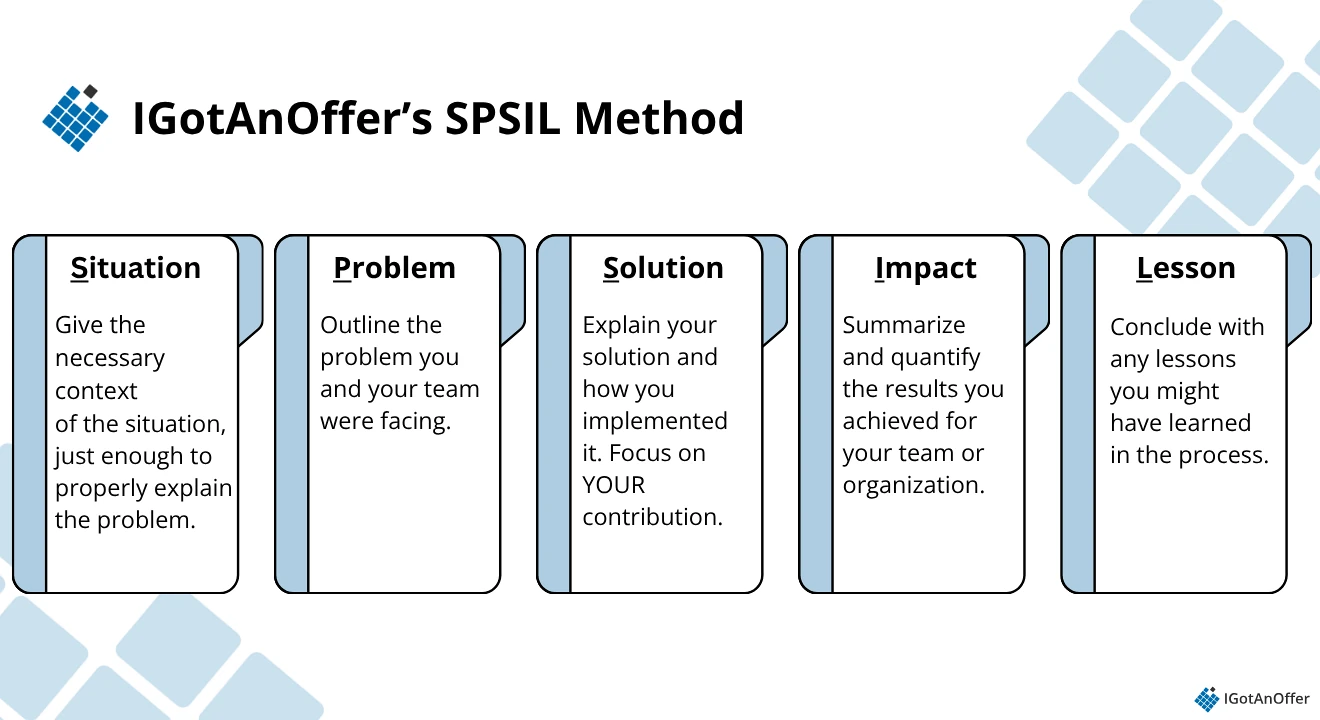
The IGotAnOffer SPSIL Method
- Situation: Start by giving the necessary context of the situation you were in. Describe your role, the team, the organization, the market, etc. You should only give the minimum context needed to understand the problem and the solution in your story. Nothing more.
- Problem: Outline the problem you and your team were facing.
- Solution: Explain the solution you came up with to solve the problem. Step through how you went about implementing your solution, and focus on your contribution over what the team / larger organization did.
- Impact: Summarize the positive results you achieved for your team, department, and organization. As much as possible, quantify the impact.
- Lessons: Conclude with any lessons you might have learned in the process.
5.2 Get used to setting up the situation in 30 seconds or less
Whether you’re using the SPSIL or STAR method to answer behavioral questions, use a timer while you practice to ensure you provide only the necessary information. Spending too much time on setting up the situation is one of the most common mistakes candidates make.
5.3 Stay focused on essential details
Interviewers hear a lot of behavioral stories each day. If you go into unnecessary details you are likely to lose their attention. Share your stories with a few different people before your interview and ask them what details they would suggest cutting.
5.4 Be proud and talk about YOU
This is not the time to be shy about your accomplishments. Concentrate on your impact, not what “the team” did. Not talking about YOU enough is another common mistake we see with a lot of candidates.
5.5 Adapt to follow-up questions
Don’t be alarmed if your interviewer asks follow-up questions; this is perfectly normal. Listen carefully to the way your interviewer is asking these questions, as there will often be a subtle clue about the specific skills they’re looking to assess from the next part of your answer.
5.6 Be honest and authentic
Be genuine in your responses. Meta interviewers appreciate authenticity and honesty. If you faced challenges or setbacks, discuss how you improved and learned from them. When talking about failure, don’t try to hide your mistakes or frame a weakness as a strength. Instead, show what you learned and how the failure helped you grow.
5.7 Be conversational
Meta wants to know if you have excellent communication skills. So make sure you approach the interview like a conversation. Ask questions about the role and what it’s like to work at Meta to show how much thought you’re considering for your application.
5.8 Get comfortable visualizing your system design process
During your technical design and architecture interview, your interviewers will want you to visualize your answer. Practice describing a past project that’s relevant to Meta by organizing it with block diagrams on a whiteboard. What your interviewers will be looking out for is how you approach a problem in a way that’s both structured and creative.
5.9 Center on Meta’s values
Familiarize yourself with Meta’s culture and core values and align your behavioral responses with them. Meta values certain attributes such as passion for technology, collaboration, and focus on the user.
6. Preparation Plan↑
Now that you know what questions to expect, let's focus on how to prepare. It's no secret that the performance bar at Meta is high. Some people even go as far as quitting their jobs to prepare for interviews full-time. This is obviously extreme and not what we recommend doing, but it shows how much effort some candidates are ready to put in.
We've coached more than 15,000 people for interviews since 2018. Below is our four-step prep plan for Meta. If you're preparing for more companies than just Meta, then check our generic engineering manager interview preparation guide.
6.1 Learn about Meta
Most candidates fail to do this. But before investing tens of hours preparing for an interview at Meta, you should take some time to make sure it's actually the right company for you.
Meta is prestigious and it's therefore tempting to ignore that step completely. But in our experience, the prestige in itself won't make you happy day-to-day. It's the type of work and the people you work with that will.
If you know engineers who work at Meta or used to work there it's a good idea to talk to them to understand what the culture is like. In addition, we would recommend reading the following:
- Meta's 6 core values
- Facebook’s hacker culture (by Mark Zuckerberg, via Wired)
- Meta annual reports and strategy presentations (by Meta)
- Meta's approach to tech trends (by CB Insights)
- Meta org culture analysis (by Panmore Institute)
- Engineering at Meta
- Meta fact sheet (by IGotAnoffer)
6.2 Practice by yourself
As we've outlined above, you'll have to prepare for several different categories of questions ahead of your Meta engineering manager interviews.
But the good news is that there is a lot of overlap between the initial interview question categories and the onsite interviews.
In this article we've recommended various deep-dive articles that will help you prepare for each question category. Here's the complete list, plus a couple extra we think could be useful.
- Official Meta guides: Meta software engineering leadership: initial interview and Meta software engineering leadership: onsite interview
- Leadership questions
- People management: People management questions in tech interviews
- Collaboration and Partnerships: Dealing with conflict, dealing with stakeholders
- General: Grokking the engineering management leadership interview, Meta behavioral interview questions
- Technical design & architecture: System design fundamentals
- Career conversation & motivation: "Why Meta?" interview question, Common behavioral questions in engineering interviews
- Retrospectives: Guide to technical retrospectives by Tony Wu (ex-FB)
- System design: Meta system design interview
- Product design: Meta product architecture interview
- Coding: Coding interview prep
- Machine learning: Meta ML engineer interview guide
We also have an article on what a real Meta interview experience is like, with success stories from people we've worked with. Check that out to get some prep best practices from successful candidates.
Interviewing for an EM role at another company? You may also want to check out our other company-specific EM interview guides:
- Microsoft engineering manager interview guide
- Google engineering manager interview guide
- Apple engineering manager interview guide
- Netflix engineering manager interview guide
- Uber engineering manager interview guide
- DoorDash engineering manager interview guide
Once you’re in command of the subject matter, you’ll want to practice answering questions. But by yourself, you can’t simulate thinking on your feet or the pressure of performing in front of a stranger. Plus, there are no unexpected follow-up questions and no feedback.
That’s why many candidates try to practice with friends or peers.
6.3 Practice with peers
If you have friends or peers who can do mock interviews with you, that's an option worth trying. It’s free, but be warned, you may come up against the following problems:
- It’s hard to know if the feedback you get is accurate
- They’re unlikely to have insider knowledge of interviews at your target company
- On peer platforms, people often waste your time by not showing up
For those reasons, many candidates skip peer mock interviews and go straight to mock interviews with an expert.
6.4 Practice with experienced engineering manager interviewers
In our experience, practicing real interviews with experts who can give you company-specific feedback makes a huge difference.
Find a Meta engineering manager interview coach so you can:
- Test yourself under real interview conditions
- Get accurate feedback from a real expert
- Build your confidence
- Get company-specific insights
- Learn how to tell the right stories, better.
- Save time by focusing your preparation
Landing a job at a big tech company often results in a $50,000 per year or more increase in total compensation. In our experience, three or four coaching sessions worth ~$500 will make a significant difference in your ability to land the job. That’s an ROI of 100x!







